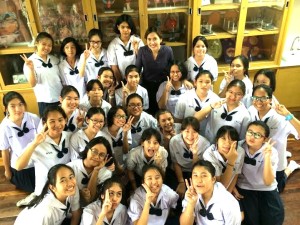
Teacher Wennie Perez-Robles with her students in Thailand. She later left for the US in an exchange program. CONTRIBUTED
SAN FRANCISCO – Wennie Perez-Robles, 34, went to Thailand in 2006 to teach English and science and to satisfy her thirst for travel. There, she met her husband, Nino Robles, also a teacher. Their daughter, now four years old, was born in Thailand and has never been to the Philippines. With family and all, however, Wennie never shed her wanderlust. So she found a way to get to the United States where she now teaches science.
“I have three reasons to travel: first to improve myself; second as a family, we wanted to travel, explore other places and take beautiful pictures, and last, we want our daughter to study in the US. We believe she can get better education there and grow up to be more independent and open-minded,” says Wennie.
Although a science teacher she doubles as a liaison officer of Northern Vance high school in Henderson, North Carolina, under the Educational Partners Institute (EPI) for cultural exchange program of the teachers from all over the world.
A native of Goa, Camarines Sur, Wennie was in the first batch of Partido State College (now Partido State University) Laboratory High School in 1999. She went to Philippine Normal University in Manila to pursue a degree in education and eventually taught at Concordia College also in Manila.
From Thailand to USA
While in Thailand, Wennie applied at an exchange program for teachers. Unfortunately, she did not have a driver’s license, so her application was stalled. She forgot all about it because she was already married and raising a family in Thailand. But America was her ultimate goal, like many Filipinos. While browsing Facebook, she came across a group of Filipinos and people of other nationalities who wanted to teach in the US.
Since having a car was also a necessity in Thailand, she learned how to drive and got a license. At the back of her mind, however, she knew she would use it in the future. Wennie applied this time at EPI and Amity Institute. These two programs are responsible for selecting participants as well as supporting and monitoring the recruits while they’re in the United States.
Wennie applied at EPI sometime in 2014. She passed all the requirements, spending only US$50 to send her original documents to the US. After evaluation and crosschecking her documents in the Philippines and in Thailand, the program approved her application.
“All the application were done online. I paid $160 dollars each for the visa and the application for a professional teaching license. Of course, I applied for a separate visa, J2, for my family. We have the same length of visa validity which is three years,” explains Wennie.
Wennie holds a J1 or the Exchange Visitor Non-Immigrant Visa. Her airfare was free; housing is her expense. Since they are on a cultural program of the government of the United States, the teachers are not allowed visa extensions as immigrants, or apply for citizenship. The goal of the program is only for exposure and to share what the teachers learned from the US schools with their home countries. The teachers from different countries are deployed to different public schools in North Carolina and other states.
Wennie’s family arrived in Henderson, North Carolina on August 4, 2015. Teachers from Jamaica, Haiti and one from the Philippines stayed in a hotel for two days for orientation and help in getting a car.
Cultural experiences
Wennie might have experienced different cultures while teaching in the Philippines and Thailand, but it is different in the US. Since her school is multiracial, she hasn’t experienced discrimination at present. Foreign teachers have the same salary and benefits as the locals.
“My students are 90 percent blacks. They call me dwarf because they are bigger and taller than me. I have some challenging students, but I always focus on those students who are interested to learn,” she says.
There is also a telephone in every classroom, so when something untoward happens she can immediately call the police. Aside from that, the administrators are always ready to assist the teachers if students are acting up in class or disrespectful. Wennie also says that in their contract, it is stipulated that they cannot take photos of their students.
“Students, I think, in the Philippines, Thailand and here are the same. They act like kids. I am teaching Grade 9 students or the equivalent of third year high school. But American kids are more vocal and assertive. They may behave differently, but they all wante to be respected and valued,” says Wennie.
Wennie also says there are good number of Filipinos in the county who are supportive of each other; thus, she has never experienced homesickness. Her husband works online while their four-year-old daughter is already attending Pre-K, which is free.
Wennie says that she is learning a lot while into her two-year stay in Henderson, from classroom management to strategies to gain the attention of the students. Open-mindedness and asking suggestions from others have improved her teaching strategies.
“Filipinos are very flexible. We can be wherever we want to be and we can shine. We just have to work hard and give love in everything we do,” concludes Wennie.
At the end of the program, Wennie’s family might go back to Thailand, which they consider their second home. But for now, the family is enjoying its remaining time in the United States.

